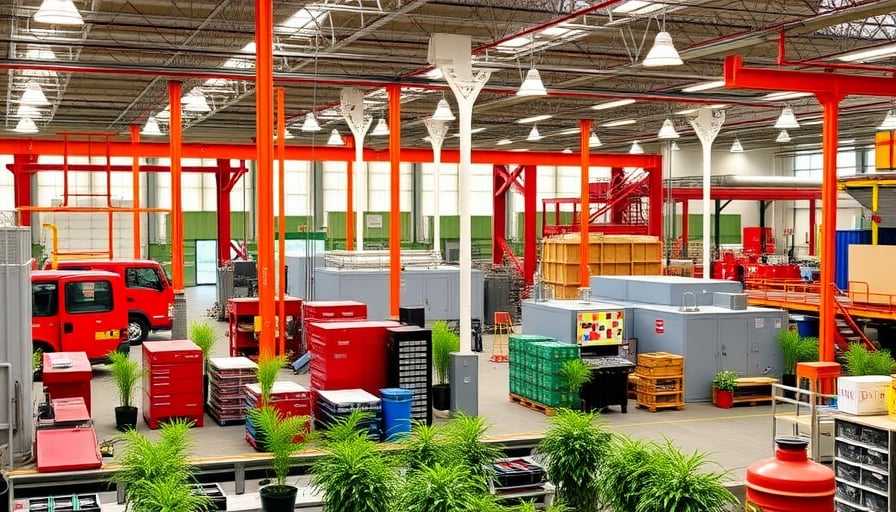Corporate News Analysis: Amcor’s Strategic Positioning and Sustainability Trajectory
Amcor, a global leader in packaging solutions, has recently demonstrated notable progress across several key dimensions of its business. The company’s recent sustainability milestones, market performance, and strategic acquisition of Berry Global collectively underscore a robust trajectory within the flexible packaging sector and the broader consumer goods market.
Sustainability Performance and Climate Commitments
Amcor has set an ambitious framework for reducing its environmental footprint, targeting comprehensive recycling and climate-related metrics. By the close of 2025, the company reports that 72 % of its sustainability targets have been achieved. This outcome is indicative of both operational efficiency and a concerted investment in circular economy initiatives. The achievement is aligned with industry benchmarks that increasingly link climate stewardship to investor confidence and regulatory compliance.
Key takeaways:
- Recycling progress: Amcor’s focus on post‑consumer and pre‑consumer recycling infrastructure has enabled a measurable uptick in material recovery rates.
- Climate targets: The company’s reduction of Scope 1 and 2 emissions is progressing toward its 2030 net‑zero pledge, positioning Amcor favorably among peers such as Sealed‑Air and International Paper.
- Investor perception: ESG (environmental, social, governance) metrics continue to drive premium valuations for companies that demonstrate tangible progress, a trend that is likely to benefit Amcor in the coming years.
Market Valuation and Investor Appeal
From a financial standpoint, Amcor’s market dynamics provide a compelling narrative for investors:
- Stock performance: The share closed at €6.776, reflecting steadiness amid broader market volatility.
- Market capitalization: At €15.64 billion, Amcor ranks within the top tier of packaging firms, indicating substantial scale.
- Price‑to‑earnings ratio: A P/E of 22 suggests a moderate valuation relative to historical averages and comparable entities, providing a window of opportunity for value‑seeking investors.
- Dividend policy: Amcor’s consistent dividend payouts and projected yield make it an attractive proposition for income‑focused portfolios, particularly those seeking exposure to stable, cyclical sectors.
Analysts across the spectrum have reiterated the company’s “strong‑buy” stance, citing the potential for both passive income and capital appreciation. The firm’s dividend sustainability is underpinned by a solid cash‑generation pipeline, reinforced by the acquisition of Berry Global.
Acquisition of Berry Global: Market Consolidation and Growth
The recent acquisition of Berry Global represents a decisive move in the flexible packaging landscape. By integrating Berry Global’s advanced technology platforms and extensive product portfolio, Amcor:
- Expands its geographic reach – particularly in emerging markets where Berry Global holds significant distribution networks.
- Diversifies product offerings – enhancing the company’s position in high‑margin sectors such as food‑service and personal care.
- Bolsters R&D capabilities – leveraging Berry Global’s innovations in biodegradable polymers and smart packaging solutions.
Strategically, the deal is positioned to strengthen Amcor’s competitive edge against incumbents like Ball Corporation and the emerging players in the sustainable packaging niche. Economically, the consolidation is anticipated to generate cost synergies and increase bargaining power with key suppliers.
Flexible Packaging Market Outlook
The flexible packaging market, in which Amcor operates, is projected to reach $369.6 billion USD by 2030. This growth is driven by:
- Consumer demand for convenience – compact, lightweight packaging solutions that extend shelf life.
- Sustainability imperatives – regulatory pressures and consumer preferences pushing for recyclable or compostable options.
- Technological innovation – advancements in barrier coatings and active packaging that improve product performance.
Amcor’s strategic focus on sustainable materials positions it advantageously to capture a larger share of this expanding market. The company’s R&D investments in biodegradable films and renewable‑resource‑based inks are likely to resonate with both regulatory frameworks and consumer expectations.
Conclusion
Amcor’s recent achievements across sustainability, financial performance, and strategic expansion signal a well‑coordinated approach to navigating a complex and evolving industry. The company’s ability to marry environmental responsibility with robust market presence creates a compelling value proposition for investors. Nonetheless, as with all corporate developments, diligent due diligence and continuous monitoring of market dynamics remain essential for informed decision‑making.
